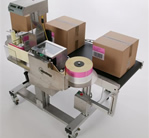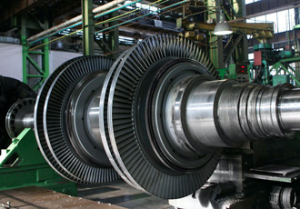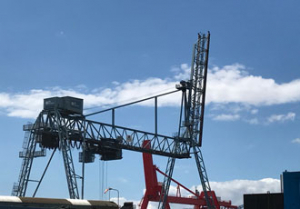Polymer bearings enhance labeller performance
7th December 2007
Source:
igus UK Limited

High reliability, an easy set-up and modular components were of key importance for the Codeology team when designing its P100 Printer Applicator. The aim was that the print and apply labeller would be the best value for money and most reliable of its kind on the market. One key part of this was using polymer plain bearings in place of standard roller bearings.
Codeology is a world class manufacturer of barcode labellers and inkjet coders. The company’s machinery is used in industries as diverse as flat-pack furniture, ready-meal production, pharmaceuticals, timber, wallpaper production and many others.
The P100 Printer Applicator is predominantly aluminium and steel and was developed for demanding factory environments where production lines must run at peak efficiency. It is designed to be highly reliable, high quality, reliable and robust, with an easy set-up and modular components to ensure minimal intervention.
Codeology wanted to design out some of the problems historically associated with printer applicators, such as roller bearings, which require lubricating and are susceptible to dust and moisture. Ball bearings also need to be pressed into housings prior to being run on shafts, which impacted production throughput.
A visit from an igus® sales engineer presented an ideal alternative: the polymer developer’s range of iglidur® injection moulded plain bearings. These are all characteristically self-lubricating, impervious to dirt and dust and able to fit straight onto a shaft. They are also low cost, which was important for the company in its goal to make the P100 the most cost effective print and apply labeller available.
Jim Mason, Director at Codeology, explains, “An igus sales engineer visited, understood what we were doing straightaway and advised us on which products would be right for us. He supplied samples and kept in close contact as we made the prototypes. Early models showed that we had to re-think a couple of concepts and the engineer again came down and talked it through with us. More samples were supplied and the next models worked perfectly.”
The main drive roller spindle uses a polymer plain flange bearing from the iglidur G range. This bearing is often subject to high side loads and dusty environments, coupled with stop-start conditions. In contrast, ball bearings would suffer from dust contamination, especially biscuit dust and flour, for example, which affects the bearings over time. However, the igus bearings have been completely unaffected by the environment since their integration on the P100. The flange on the bearing helps to maintain the vertical position of the drive roller, whereas the vertical forces operating on ball bearings could wind the roller into the surrounding metalwork.
iglidur G sleeve bearings are used for the stand winding handle and rack and pinion spindles. Although used infrequently, these polymer plain bearings must also withstand very heavy side loads. As the hand wound spindles rotate rarely and at low speeds, bearing clearances become less important than usual. This allows Codeology to cut bearing holes into the 3mm stainless steel side plates while they are being laser cut. The bearings can then be pushed straight in. Flange bearings from the same range are then used to butt up against the spindle fixing circlips, thus holding both the spindle and the bearing in place. Any other bearing technology would require a machined hole to fixed tolerances, which would require extra work and cost.
Flange bearings are also used on the idler rollers. These are operated intermittently, but the bearings are once again subject to high side loads. In addition, roller bearings would not fit easily into the limited available space and those that did fit tended to be more expensive than igus bearings. The iglidur G bearing flanges allow the rollers a degree of vertical movement on the spindles, whilst acting as end stops on the chassis plates or spindle circlips, without hampering the spindle rotation.
The 250 mm long tensioning arms use iglidur G flange bearings in the pivot point at one end, where they are subject to very high radial loads. Roller bearings will not fit and still allow the use of a big enough spindle to cope with the loads. The thin wall of the igus bearings allows a 15 mm spindle to be used in the 20 mm arm.
For the adjoining conveyor design, Codeology uses flange bearings at the top and bottom of the 20 mm diameter guide spindles. This gives a face for the circlip on the bottom and support for the guiding conveyor when it is rotated. It also gives a rigid assembly without having to drill very tight tolerance holes into the conveyor side.
An “igubal®” rod end bearing from igus’ spherical range is also used as a tensioner to pull the rollers controlling the machine’s vertical movement right up to the supporting stand.
Jim Mason, Director at Codeology, says, “With igus bearings, we used proven labelling methods, but we were also able to take the opportunity to remove several failure modes and improve reliability further by using new bearing technology. Where previously many ball bearings would have been used, we have incorporated various igus bearings instead. These have proved to be easier to install, lower cost and offer improved performance in terms of ease of maintenance and improved life expectancy over ball bearings. It also makes it easier to sell the machine. Most of our customers know of, or have experience of igus bearings. The response by the customer to our machine is always enthusiastic as they know how reliable and easy to use the igus technology is.”
iglidur G bearings can be used in an extremely wide range of applications. They can be used on different shaft materials, for oscillating and rotational movements and are dry running, cost-effective, dirt resistant and vibration dampening. They also have a high wear resistance and are available in over 900 sizes ex-stock directly from igus.
The igubal bearings range includes self-aligning spherical, pillow block and rod end bearings. They compensate for misalignment and in many cases replace special housings. They are vibration dampening, can operate in liquids or chemicals and are resistant to dirt and dust, which can impede the performance of greased metal components. They are also 80% lighter than steel.
Jim Mason explains that, since igus bearings were integrated two years ago, “We haven't looked back. I recently visited one of my customers, which has ten of our machines operating 24/7 in the arduous environment of a frozen food factory. They have all been running for 12 months and not one igus bearing needed attention.”
The P100 Printer Applicator is predominantly aluminium and steel and was developed for demanding factory environments where production lines must run at peak efficiency. It is designed to be highly reliable, high quality, reliable and robust, with an easy set-up and modular components to ensure minimal intervention.
Codeology wanted to design out some of the problems historically associated with printer applicators, such as roller bearings, which require lubricating and are susceptible to dust and moisture. Ball bearings also need to be pressed into housings prior to being run on shafts, which impacted production throughput.
A visit from an igus® sales engineer presented an ideal alternative: the polymer developer’s range of iglidur® injection moulded plain bearings. These are all characteristically self-lubricating, impervious to dirt and dust and able to fit straight onto a shaft. They are also low cost, which was important for the company in its goal to make the P100 the most cost effective print and apply labeller available.
Jim Mason, Director at Codeology, explains, “An igus sales engineer visited, understood what we were doing straightaway and advised us on which products would be right for us. He supplied samples and kept in close contact as we made the prototypes. Early models showed that we had to re-think a couple of concepts and the engineer again came down and talked it through with us. More samples were supplied and the next models worked perfectly.”
The main drive roller spindle uses a polymer plain flange bearing from the iglidur G range. This bearing is often subject to high side loads and dusty environments, coupled with stop-start conditions. In contrast, ball bearings would suffer from dust contamination, especially biscuit dust and flour, for example, which affects the bearings over time. However, the igus bearings have been completely unaffected by the environment since their integration on the P100. The flange on the bearing helps to maintain the vertical position of the drive roller, whereas the vertical forces operating on ball bearings could wind the roller into the surrounding metalwork.
iglidur G sleeve bearings are used for the stand winding handle and rack and pinion spindles. Although used infrequently, these polymer plain bearings must also withstand very heavy side loads. As the hand wound spindles rotate rarely and at low speeds, bearing clearances become less important than usual. This allows Codeology to cut bearing holes into the 3mm stainless steel side plates while they are being laser cut. The bearings can then be pushed straight in. Flange bearings from the same range are then used to butt up against the spindle fixing circlips, thus holding both the spindle and the bearing in place. Any other bearing technology would require a machined hole to fixed tolerances, which would require extra work and cost.
Flange bearings are also used on the idler rollers. These are operated intermittently, but the bearings are once again subject to high side loads. In addition, roller bearings would not fit easily into the limited available space and those that did fit tended to be more expensive than igus bearings. The iglidur G bearing flanges allow the rollers a degree of vertical movement on the spindles, whilst acting as end stops on the chassis plates or spindle circlips, without hampering the spindle rotation.
The 250 mm long tensioning arms use iglidur G flange bearings in the pivot point at one end, where they are subject to very high radial loads. Roller bearings will not fit and still allow the use of a big enough spindle to cope with the loads. The thin wall of the igus bearings allows a 15 mm spindle to be used in the 20 mm arm.
For the adjoining conveyor design, Codeology uses flange bearings at the top and bottom of the 20 mm diameter guide spindles. This gives a face for the circlip on the bottom and support for the guiding conveyor when it is rotated. It also gives a rigid assembly without having to drill very tight tolerance holes into the conveyor side.
An “igubal®” rod end bearing from igus’ spherical range is also used as a tensioner to pull the rollers controlling the machine’s vertical movement right up to the supporting stand.
Jim Mason, Director at Codeology, says, “With igus bearings, we used proven labelling methods, but we were also able to take the opportunity to remove several failure modes and improve reliability further by using new bearing technology. Where previously many ball bearings would have been used, we have incorporated various igus bearings instead. These have proved to be easier to install, lower cost and offer improved performance in terms of ease of maintenance and improved life expectancy over ball bearings. It also makes it easier to sell the machine. Most of our customers know of, or have experience of igus bearings. The response by the customer to our machine is always enthusiastic as they know how reliable and easy to use the igus technology is.”
iglidur G bearings can be used in an extremely wide range of applications. They can be used on different shaft materials, for oscillating and rotational movements and are dry running, cost-effective, dirt resistant and vibration dampening. They also have a high wear resistance and are available in over 900 sizes ex-stock directly from igus.
The igubal bearings range includes self-aligning spherical, pillow block and rod end bearings. They compensate for misalignment and in many cases replace special housings. They are vibration dampening, can operate in liquids or chemicals and are resistant to dirt and dust, which can impede the performance of greased metal components. They are also 80% lighter than steel.
Jim Mason explains that, since igus bearings were integrated two years ago, “We haven't looked back. I recently visited one of my customers, which has ten of our machines operating 24/7 in the arduous environment of a frozen food factory. They have all been running for 12 months and not one igus bearing needed attention.”
Similar articles
More from igus UK Limited
- From garage business to world leader: igus founders celebrate 90th birthday 22nd June 2021
- VOTW - Metal out plastic in! 10th June 2021
- igus robot works alongside agri-tech startup 18th May 2021
- Tribo-polymers increase machine service life and efficiency 10th May 2021

-(1)ed.jpg)










Write a comment
No comments